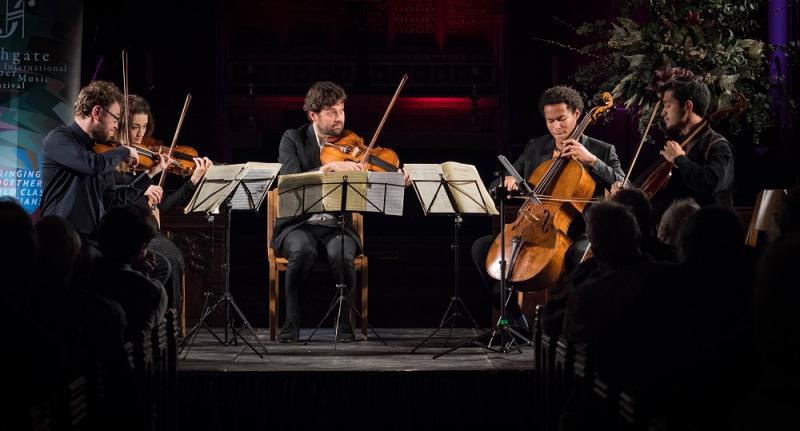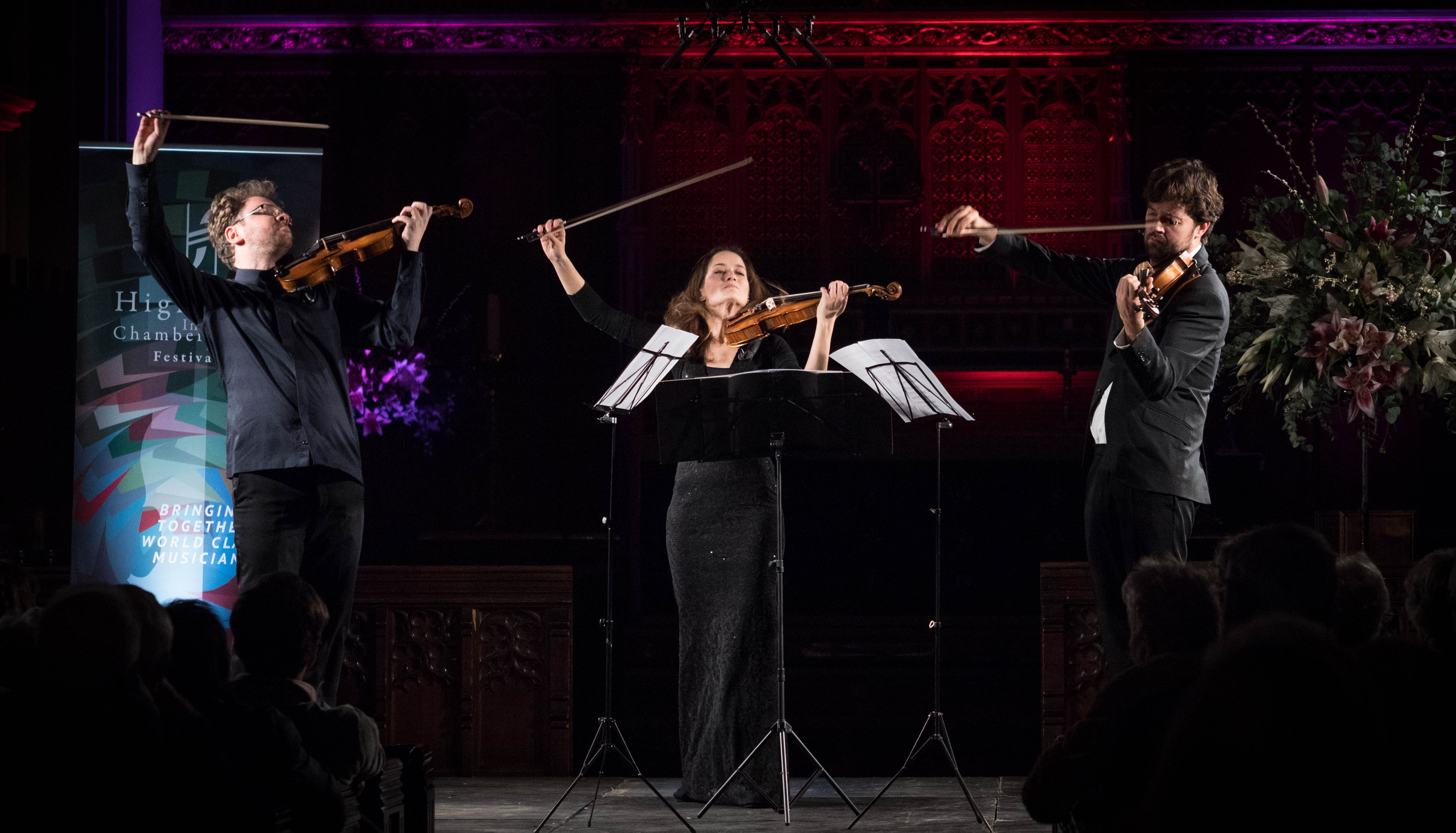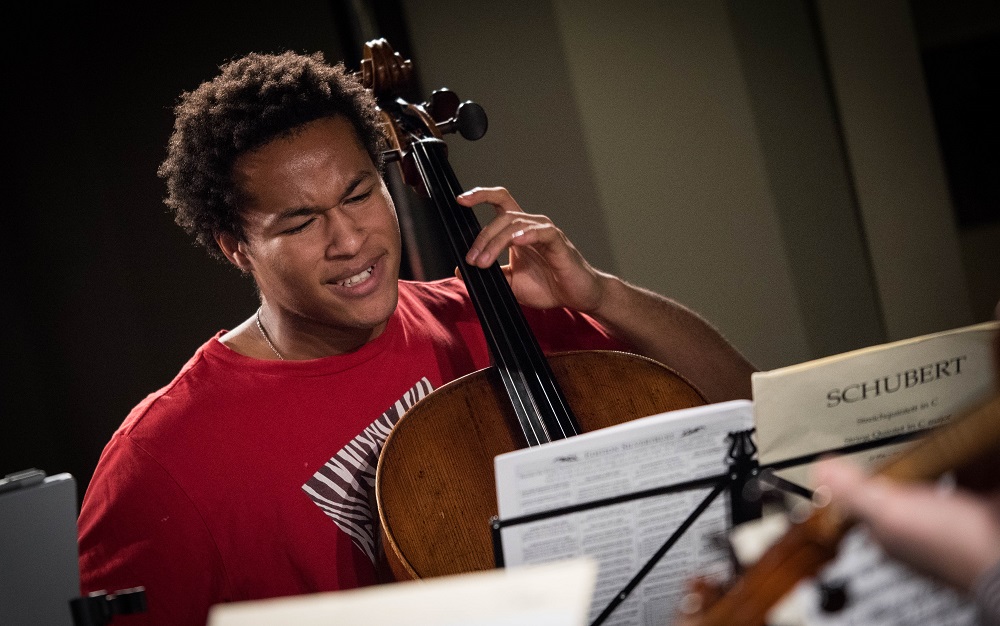Highgate International Chamber Music Festival opening concert review - top soloists blend to perfection | reviews, news & interviews
Highgate International Chamber Music Festival opening concert review - top soloists blend to perfection
Highgate International Chamber Music Festival opening concert review - top soloists blend to perfection
Sheku Kanneh-Mason is only the best-known name in a quintet of leading string players

When celebrated individuals get together to play chamber music on special occasions, the result can often turn out as what the late cellist of the Borodin Quartet, Valentin Berlinsky, disparagingly called "festival quality" – meaning a clash, rather than a blend, of personalities.
Two of its three founders, violinist/composer Natalie Klouda and cellist Ashok Klouda, had invited two of the most experienced soloists in the string world - powerful personality Alexander Sitkovetsky and peak exponent of viola-playing Lawrence Power – and, currently, the most famous, 20 year-old Sheku Kanneh Mason. If Sitkovetsky led, no-one dominated, and a big programme culminated in a profound interpretation of Schubert's String Quintet (nothing less will do in this greatest of masterpieces).  Sitkovetsky can generate a live charge among players, and not always where you expect it. The end of Dvořák's Terzetto in C, for which he teamed up with Natalie Klouda and Power (pictured above), suddenly took on an aspect of the demonic after so much leisurely lyricism, and that devilry carried over into the first movement of Beethoven's "Kreutzer" Sonata in an anonymous 1832 arrangement for string quintet. It works like a dream: the composer wrote that the sonata was composed "in the concertante style", and it verges on the symphonic. A lighter touch is needed for a finale seemingly tacked in a lighter vein, and there was nimble dancing here to offset the grand scale.
Sitkovetsky can generate a live charge among players, and not always where you expect it. The end of Dvořák's Terzetto in C, for which he teamed up with Natalie Klouda and Power (pictured above), suddenly took on an aspect of the demonic after so much leisurely lyricism, and that devilry carried over into the first movement of Beethoven's "Kreutzer" Sonata in an anonymous 1832 arrangement for string quintet. It works like a dream: the composer wrote that the sonata was composed "in the concertante style", and it verges on the symphonic. A lighter touch is needed for a finale seemingly tacked in a lighter vein, and there was nimble dancing here to offset the grand scale.
All of it resounded in what could seem like the dauntingly large and not especially friendly space of St Michael's Church. I was looking down from above, changing sides after the interval due to some welcome but rather over-vocal and thuddy kids on the south gallery. That meant standing to see in the second row for the Schubert, but it's welcome to be able to move with the hectic flushes of the dying composer's testament to life. Kanneh-Mason is always a joy to watch in the facial expressions which spell out his supreme musicianship; here he swapped the second-cello role with Ashok Klouda, which allowed him to sing the fragile lullaby bringing temporary peace to the unquiet opening movement and later to lean in to duet with Power, another supremely attentive musician (Kanneh-Mason pictured below in rehearsal).  What has to be the best-loved of all Adagios went at more of an Andante pace, a stammering but passionate statement of love for life rather than the ethereal crossing-over it often becomes; that meant that the true spotlights of pulse-slowing, in the sombre move back from the cental protest to the recap and, most remarkably of all, at the dead centre of the Scherzo, had their proper gravity. There was plenty of it, too, in the Allegretto finale, where – again, I suspect, due to Sitkovetsky's powerful lead – the demonic was never long at bay. There are two dances of death in the second half of the work, and the players brought their full power and grit to a searing and sustained sense of shock. Then it was to be Ashok Klouda's solo turn in a late-night Bach Fifth Cello Suite, but with the main concert finishing at way past 10pm, those of us living on the west side of London had to beat a retreat, grateful for what we'd heard.
What has to be the best-loved of all Adagios went at more of an Andante pace, a stammering but passionate statement of love for life rather than the ethereal crossing-over it often becomes; that meant that the true spotlights of pulse-slowing, in the sombre move back from the cental protest to the recap and, most remarkably of all, at the dead centre of the Scherzo, had their proper gravity. There was plenty of it, too, in the Allegretto finale, where – again, I suspect, due to Sitkovetsky's powerful lead – the demonic was never long at bay. There are two dances of death in the second half of the work, and the players brought their full power and grit to a searing and sustained sense of shock. Then it was to be Ashok Klouda's solo turn in a late-night Bach Fifth Cello Suite, but with the main concert finishing at way past 10pm, those of us living on the west side of London had to beat a retreat, grateful for what we'd heard.
rating
Explore topics
Share this article
The future of Arts Journalism
You can stop theartsdesk.com closing!
We urgently need financing to survive. Our fundraising drive has thus far raised £49,000 but we need to reach £100,000 or we will be forced to close. Please contribute here: https://gofund.me/c3f6033d
And if you can forward this information to anyone who might assist, we’d be grateful.

Subscribe to theartsdesk.com
Thank you for continuing to read our work on theartsdesk.com. For unlimited access to every article in its entirety, including our archive of more than 15,000 pieces, we're asking for £5 per month or £40 per year. We feel it's a very good deal, and hope you do too.
To take a subscription now simply click here.
And if you're looking for that extra gift for a friend or family member, why not treat them to a theartsdesk.com gift subscription?
more Classical music
 From Historical to Hip-Hop, Classically Black Music Festival, Kings Place review - a cluster of impressive stars for the future
From quasi-Mozartian elegance to the gritty humour of a kitchen inspection
From Historical to Hip-Hop, Classically Black Music Festival, Kings Place review - a cluster of impressive stars for the future
From quasi-Mozartian elegance to the gritty humour of a kitchen inspection
 Shibe, LSO, Adès, Barbican review - gaudy and glorious new music alongside serene Sibelius
Adès’s passion makes persuasive case for the music he loves, both new and old
Shibe, LSO, Adès, Barbican review - gaudy and glorious new music alongside serene Sibelius
Adès’s passion makes persuasive case for the music he loves, both new and old
 Anja Mittermüller, Richard Fu, Wigmore Hall review - a glorious hall debut
The Austrian mezzo shines - at the age of 22
Anja Mittermüller, Richard Fu, Wigmore Hall review - a glorious hall debut
The Austrian mezzo shines - at the age of 22
 First Person: clarinettist Oliver Pashley on the new horizons of The Hermes Experiment's latest album
Compositions by members of this unusual quartet feature for the first time
First Person: clarinettist Oliver Pashley on the new horizons of The Hermes Experiment's latest album
Compositions by members of this unusual quartet feature for the first time
 Gesualdo Passione, Les Arts Florissants, Amala Dior Company, Barbican review - inspired collaboration excavates the music's humanity
At times it was like watching an anarchic religious procession
Gesualdo Passione, Les Arts Florissants, Amala Dior Company, Barbican review - inspired collaboration excavates the music's humanity
At times it was like watching an anarchic religious procession
 Classical CDs: Camels, concrete and cabaret
An influential American composer's 90th birthday box, plus British piano concertos and a father-and-son duo
Classical CDs: Camels, concrete and cabaret
An influential American composer's 90th birthday box, plus British piano concertos and a father-and-son duo
 Cockerham, Manchester Camerata, Sheen, Martin Harris Centre, Manchester review - re-enacting the dawn of modernism
Two UK premieres added to three miniatures from a seminal event of January 1914
Cockerham, Manchester Camerata, Sheen, Martin Harris Centre, Manchester review - re-enacting the dawn of modernism
Two UK premieres added to three miniatures from a seminal event of January 1914
 Kempf, Brno Philharmonic, Davies, Bridgewater Hall, Manchester review - European tradition meets American jazz
Bouncing Czechs enjoy their Gershwin and Brubeck alongside Janáček and Dvořák
Kempf, Brno Philharmonic, Davies, Bridgewater Hall, Manchester review - European tradition meets American jazz
Bouncing Czechs enjoy their Gershwin and Brubeck alongside Janáček and Dvořák
 Solomon, OAE, Butt, QEH review - daft Biblical whitewashing with great choruses
Even a top soprano and mezzo can’t make this Handel paean wholly convincing
Solomon, OAE, Butt, QEH review - daft Biblical whitewashing with great choruses
Even a top soprano and mezzo can’t make this Handel paean wholly convincing
 Two-Piano Gala, Kings Place review - shining constellations
London Piano Festival curators and illustrious friends entertain and enlighten
Two-Piano Gala, Kings Place review - shining constellations
London Piano Festival curators and illustrious friends entertain and enlighten
 Echo Vocal Ensemble, Latto, Union Chapel review - eclectic choral programme garlanded with dance
Beautiful singing at the heart of an imaginative and stylistically varied concert
Echo Vocal Ensemble, Latto, Union Chapel review - eclectic choral programme garlanded with dance
Beautiful singing at the heart of an imaginative and stylistically varied concert
 Scott, Irish Baroque Orchestra, Whelan, RIAM, Dublin review - towards a Mozart masterpiece
Characteristic joy and enlightenment from this team, but a valveless horn brings problems
Scott, Irish Baroque Orchestra, Whelan, RIAM, Dublin review - towards a Mozart masterpiece
Characteristic joy and enlightenment from this team, but a valveless horn brings problems

Add comment